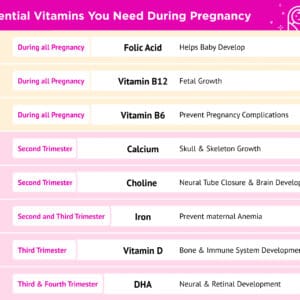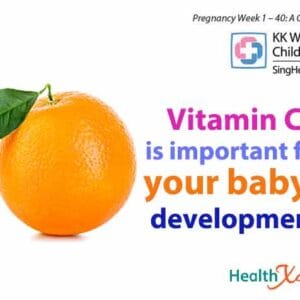During pregnancy, a woman’s body undergoes significant changes to support the growth and development of her baby. One crucial aspect of prenatal care is ensuring adequate nutrient intake, with vitamin D being particularly important. Research has shown that vitamin D plays a vital role in fetal development, maternal health, and potentially reducing pregnancy complications. As expectant mothers prioritize their health, understanding the safety and benefits of vitamin D supplementation is essential. This article examines the importance of vitamin D during pregnancy, its benefits, and safety considerations to provide a comprehensive overview for pregnant women and healthcare providers.

The Importance of Vitamin D During Pregnancy
Vitamin D is a crucial nutrient that plays a significant role in maintaining the health of pregnant women and their developing fetuses. It is essential for the regulation of calcium and phosphate levels, which are vital for the development of the fetus’s bones, teeth, and muscles. Moreover, Vitamin D has been linked to a reduced risk of pregnancy complications, such as preeclampsia and gestational diabetes.
Benefits of Vitamin D for Pregnant Women
Vitamin D offers numerous benefits for pregnant women, including the reduction of pregnancy-related complications. Research has shown that adequate levels of Vitamin D during pregnancy can lower the risk of preeclampsia, a condition characterized by high blood pressure and damage to organs such as the kidneys and liver. Additionally, Vitamin D has been associated with a lower risk of gestational diabetes, a condition that can lead to complications during pregnancy and childbirth.
| Benefits | Description |
|---|---|
| Reduced risk of preeclampsia | Vitamin D helps regulate blood pressure and reduce the risk of preeclampsia |
| Lower risk of gestational diabetes | Vitamin D has been linked to improved glucose metabolism and reduced risk of gestational diabetes |
| Improved bone health | Vitamin D is essential for calcium absorption and bone development |
Vitamin D and Fetal Development
Vitamin D is crucial for the development of the fetus, particularly during the early stages of pregnancy. It plays a vital role in the regulation of calcium and phosphate levels, which are necessary for the development of the fetus’s skeletal system. Research has shown that Vitamin D deficiency during pregnancy can lead to an increased risk of congenital rickets and other skeletal abnormalities.
| Fetal Development | Description |
|---|---|
| Skeletal development | Vitamin D regulates calcium and phosphate levels for bone development |
| Congenital rickets | Vitamin D deficiency can lead to an increased risk of congenital rickets |
| Muscle development | Vitamin D is necessary for muscle development and function |
Food Sources of Vitamin D
Pregnant women can obtain Vitamin D through a variety of food sources, including fatty fish, fortified dairy products, and cereals. Fatty fish, such as salmon and mackerel, are rich in Vitamin D, while fortified dairy products, such as milk and yogurt, are also good sources.
| Food Sources | Vitamin D Content |
|---|---|
| Salmon | High |
| Mackerel | High |
| Fortified milk | Moderate |
| Cereals | Moderate |
Recommended Vitamin D Intake During Pregnancy
The recommended daily intake of Vitamin D during pregnancy varies by country and health organization. However, most health organizations recommend that pregnant women consume at least 600-800 IU of Vitamin D per day.
| Health Organization | Recommended Daily Intake |
|---|---|
| Institute of Medicine | 600 IU |
| American College of Obstetricians and Gynecologists | 600-800 IU |
| Endocrine Society | 1500-2000 IU |
Vitamin D Deficiency During Pregnancy
Vitamin D deficiency is a common condition during pregnancy, particularly among women with limited sun exposure, darker skin, or those who follow a vegan or vegetarian diet. Vitamin D deficiency can lead to a range of complications, including preeclampsia and gestational diabetes.
| Risk Factors | Description |
|---|---|
| Limited sun exposure | Vitamin D is produced in the skin upon exposure to sunlight |
| Darker skin | Melanin can reduce Vitamin D production in the skin |
| Vegan or vegetarian diet | Vitamin D is found in limited amounts in plant-based foods |
What are the benefits of vitamin D in pregnancy?

Vitamin D plays a crucial role in maintaining a healthy pregnancy. The benefits of vitamin D in pregnancy are multifaceted, impacting both the mother’s and the fetus’s health. One of the primary advantages is its role in calcium absorption and bone health. Vitamin D helps regulate calcium levels, which is essential for the development of the fetus’s bones, teeth, and muscles.
Fetal Development and Vitamin D
Vitamin D is crucial for the proper development of the fetus. It influences the expression of genes involved in fetal development and is associated with a lower risk of preterm birth and low birth weight. Research has shown that adequate vitamin D levels during pregnancy can have a positive impact on fetal development.
- Regulation of gene expression that influences fetal growth and development.
- Association with reduced risk of preterm labor and related complications.
- Impact on the development of the fetus’s immune system.
Maternal Health Benefits
For the mother, vitamin D is important for maintaining bone health and reducing the risk of osteoporosis and fractures. It also plays a role in immune system regulation, potentially lowering the risk of infections and autoimmune diseases during pregnancy. Moreover, some studies suggest a link between vitamin D levels and a reduced risk of gestational diabetes mellitus and preeclampsia.
- Maintenance of maternal bone density and reduction of osteoporosis risk.
- Regulation of the immune response to reduce infection risk.
- Potential reduction in the risk of developing gestational diabetes.
Long-term Health Implications
The benefits of vitamin D during pregnancy extend beyond the gestational period, potentially influencing the long-term health of both mother and child. It has been suggested that vitamin D status during pregnancy may affect the child’s risk of developing allergies, asthma, and autoimmune diseases later in life. Additionally, maternal vitamin D levels may influence the child’s bone health and metabolic health.
- Influence on the child’s risk of developing atopic diseases.
- Potential impact on the child’s long-term bone health and density.
- Association with the child’s future risk of metabolic syndrome components.
What does vitamin D do for babies in the womb?

Vitamin D plays a crucial role in the development of babies in the womb. It is essential for the regulation of calcium levels and bone health. Research has shown that vitamin D deficiency during pregnancy can lead to various complications, including preeclampsia, gestational diabetes, and low birth weight.
Role of Vitamin D in Fetal Development
Vitamin D is necessary for the proper development of the fetus, particularly in the regulation of cell growth and differentiation. It has been shown to influence the expression of genes involved in fetal development, including those related to bone formation and immune system development.
- Regulation of calcium homeostasis to support fetal bone development
- Influence on gene expression to regulate cell growth and differentiation
- Support for the development of the immune system to prevent infections
Effects of Vitamin D Deficiency on Fetal Health
A deficiency in vitamin D during pregnancy has been linked to several adverse outcomes for the fetus. These include an increased risk of respiratory infections, asthma, and autoimmune diseases.
- Increased risk of respiratory infections due to impaired immune system development
- Higher likelihood of developing asthma and other respiratory conditions
- Potential increased risk of autoimmune diseases, such as type 1 diabetes
Importance of Vitamin D Supplementation During Pregnancy
Given the importance of vitamin D for fetal development and the potential consequences of deficiency, supplementation during pregnancy is often recommended. This is particularly true for women who are at high risk of deficiency, such as those with limited sun exposure, darker skin, or a diet lacking in vitamin D-rich foods.
- Vitamin D supplements can help maintain adequate levels during pregnancy
- Targeted supplementation for high-risk groups, such as those with limited sun exposure
- Importance of a balanced diet that includes vitamin D-rich foods, such as fatty fish and fortified dairy products
Is 800 IU of vitamin D safe during pregnancy?

The safety of vitamin D supplementation during pregnancy is a topic of ongoing debate. Vitamin D is crucial for maintaining bone health and immune function in both the mother and the fetus. The recommended daily intake varies among different health organizations, but 800 IU is within the range considered safe by many.
Benefits of Vitamin D Supplementation During Pregnancy
Vitamin D supplementation during pregnancy has been associated with several benefits, including a reduced risk of preeclampsia and gestational diabetes mellitus. It also plays a role in fetal development, particularly in bone health. Some studies suggest that adequate levels of vitamin D may reduce the risk of respiratory infections in newborns.
- Reduced risk of preeclampsia: Preeclampsia is a condition characterized by high blood pressure and often accompanied by significant amounts of protein in the urine, developing after 20 weeks of gestation.
- Lower risk of gestational diabetes: Gestational diabetes is a condition of high blood sugar that is first recognized during pregnancy, and it can have significant implications for both mother and baby.
- Improved fetal bone health: Vitamin D is essential for calcium absorption and bone mineralization, making it crucial for the development of the fetus’s bones, teeth, and muscles.
Potential Risks and Considerations
While 800 IU of vitamin D is generally considered safe, there are potential risks associated with both deficiency and excess. Vitamin D toxicity can occur with very high doses, leading to hypercalcemia, which can cause a range of symptoms from nausea and vomiting to more serious complications like kidney stones. Pregnant women should be cautious and consult their healthcare provider.
- Risk of hypercalcemia: High levels of calcium in the blood can lead to various health issues, including kidney damage and heart problems.
- Interaction with other nutrients: Vitamin D interacts with other nutrients, such as calcium and phosphorus, and an imbalance can lead to complications.
- Individual variability in vitamin D metabolism: People metabolize vitamin D differently, and some may require adjusted supplementation based on their individual health status and genetic factors.
Guidelines and Recommendations
Different health organizations have issued guidelines regarding vitamin D supplementation during pregnancy. The American College of Obstetricians and Gynecologists (ACOG) and other bodies recommend that pregnant women follow a healthcare provider’s advice regarding vitamin D supplementation. The dose of 800 IU is considered reasonable by many standards, but individual needs may vary.
- Screening for vitamin D deficiency: Some guidelines suggest screening high-risk populations for vitamin D deficiency to guide supplementation.
- Personalized supplementation: The dose and need for vitamin D supplementation can vary based on factors like skin pigmentation, dietary intake, and sun exposure.
- Monitoring for toxicity: Although rare, the risk of toxicity should be considered, especially in women taking high doses or with certain underlying health conditions.
What is the side effect of vitamin D in pregnancy?

Vitamin D is an essential nutrient during pregnancy, playing a crucial role in maintaining the health of both the mother and the fetus. However, like any other supplement, excessive intake of vitamin D can have adverse effects.
Potential Risks of High Vitamin D Levels
High levels of vitamin D in pregnancy can lead to hypercalcemia, a condition characterized by elevated calcium levels in the blood. This can cause a range of symptoms, including nausea, vomiting, and weakness. In severe cases, it can also lead to more serious complications, such as kidney damage and cardiac arrhythmias. Some of the potential risks associated with high vitamin D levels during pregnancy include:
- Fetal abnormalities: Excessive vitamin D can cause fetal abnormalities, such as supravalvular aortic stenosis, a condition where the aorta is narrowed.
- Pregnancy complications: High vitamin D levels have been linked to an increased risk of pregnancy complications, including preeclampsia and preterm labor.
- Neonatal complications: Babies born to mothers with high vitamin D levels may experience neonatal hypercalcemia, which can lead to symptoms such as irritability and poor feeding.
Safe Intake Levels During Pregnancy
The recommended daily intake of vitamin D during pregnancy varies by organization, but most agree that pregnant women should aim for around 600-800 IU per day. However, some women may require higher doses, particularly those with vitamin D deficiency or at risk of deficiency. It is essential for pregnant women to consult their healthcare provider before taking any supplements, including vitamin D. Some key considerations for safe intake levels include:
- Individual needs: The recommended intake may vary depending on individual factors, such as skin color, sun exposure, and dietary habits.
- Monitoring levels: Regular monitoring of vitamin D levels can help healthcare providers adjust supplement doses and minimize the risk of adverse effects.
- Dietary sources: Pregnant women can also obtain vitamin D through dietary sources, such as fatty fish, fortified dairy products, and cereals.
Interactions with Other Nutrients
Vitamin D interacts with other nutrients, including calcium and magnesium, to maintain bone health. During pregnancy, it is crucial to maintain a balanced intake of these nutrients to support fetal development and maternal health. Some key interactions to be aware of include:
- Calcium absorption: Vitamin D helps regulate calcium absorption, which is essential for fetal bone development.
- Magnesium balance: Vitamin D and magnesium interact to maintain bone health, and an imbalance can lead to complications.
- Other nutrient interactions: Vitamin D may also interact with other nutrients, such as vitamin K and phosphorus, to regulate bone metabolism.
Frequently Asked Questions
Is Vitamin D safe to take during pregnancy?
Taking Vitamin D during pregnancy is generally considered safe when done under the guidance of a healthcare provider. Vitamin D plays a crucial role in maintaining bone health and immune function in both the mother and the developing fetus. However, it’s essential to follow the recommended dosage to avoid toxicity. High levels of Vitamin D can lead to hypercalcemia, a condition characterized by elevated calcium levels in the blood, which can have adverse effects on both the mother and the baby. Pregnant women should consult their healthcare provider to determine the appropriate Vitamin D supplement dosage based on their individual needs and health status.
What are the benefits of Vitamin D for pregnant women?
Vitamin D offers several benefits for pregnant women, including supporting fetal development and maintaining maternal health. It is crucial for the regulation of calcium and phosphorus levels, which are essential for the development of the fetus’s bones, teeth, and muscles. Moreover, Vitamin D has been associated with a reduced risk of preeclampsia, gestational diabetes, and other pregnancy-related complications. Adequate Vitamin D levels may also support a healthy immune system and potentially reduce the risk of respiratory infections in both the mother and the newborn.
How does Vitamin D deficiency affect pregnancy?
A Vitamin D deficiency during pregnancy can have significant consequences for both the mother and the baby. It is associated with an increased risk of preeclampsia, a condition characterized by high blood pressure and often accompanied by significant amounts of protein in the urine. Vitamin D deficiency has also been linked to a higher risk of preterm labor, low birth weight, and an increased susceptibility to infections in the newborn. Furthermore, it may affect the baby’s bone health and potentially influence the development of chronic diseases later in life.
Can Vitamin D supplements during pregnancy prevent complications?
Vitamin D supplements during pregnancy may help prevent certain complications, particularly in women with a diagnosed deficiency. By maintaining adequate Vitamin D levels, pregnant women can reduce their risk of developing gestational diabetes and preeclampsia. Additionally, Vitamin D supplementation may contribute to a healthier pregnancy outcome by supporting fetal growth and development. However, it’s crucial to follow the guidance of a healthcare provider to ensure that supplementation is tailored to the individual’s specific needs and health status, thereby maximizing the benefits while minimizing potential risks.














